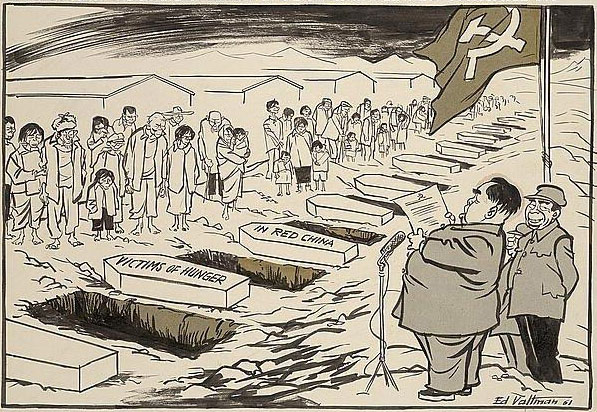Editor’s Note: The Word of the Week comes from China Digital Space’s Grass-Mud Horse Lexicon, a glossary of terms created by Chinese netizens and frequently encountered in online political discussions. These are the words of China’s online “resistance discourse,” used to mock and subvert the official language around censorship and political correctness. If you are interested in participating in this project by submitting and/or translating terms, please contact the CDT editors at CDT [at] chinadigitaltimes [dot] net.
伟光正 (wěi guāng zhèng): great, glorious and correct

A Western cartoon from the 1960s picked up by a contemporary netizen is captioned, “After the famine, the Party continues to be ‘great, glorious and correct’” (大饥荒后,中共继续“伟光正”).
The Chinese Communist Party has described itself as “great, glorious and correct” (伟大光荣正确 wěidà guāngróng zhèngquè) for over 40 years. A 2001 People’s Daily editorial is titled (with characteristic lack of irony) “The Communist Party of China is historically proved great, glorious and correct.” Recently, however, netizens have turned this term on its head and used it to sarcastically refer to the Party’s stubborn insistence that it is always in the right.
Netizens use the phrase in a number of ways:
1. As an adjective. Example: “When the country remains underdeveloped it is because the quality of the citizens is too low and domestic conditions are too complicated. When the country develops it is completely because they are great, glorious and correct” ( 国家发展不起来,是因为国民素质太低,国情太复杂。国家发展起来,全是因为他们伟光正了).
2. As a reference to the Party. “Great, glorious and correct cadres” (伟光正的干部).
3. As a personal name. Wei guang zheng sounds like someone’s name. A fake Baidu Dictionary entry on Comrade Wei Guangzheng (Chinese) describes a man who always thinks he is right, even though he clearly is not.
Political cartoonist Crazy Crab has illustrated the grass-mud horse use of “great, glorious and correct” in his Hexie Farm series for CDT: see “Mirror, Mirror on the Wall,” “The Dragon Boat” and “The Loudspeaker.”








